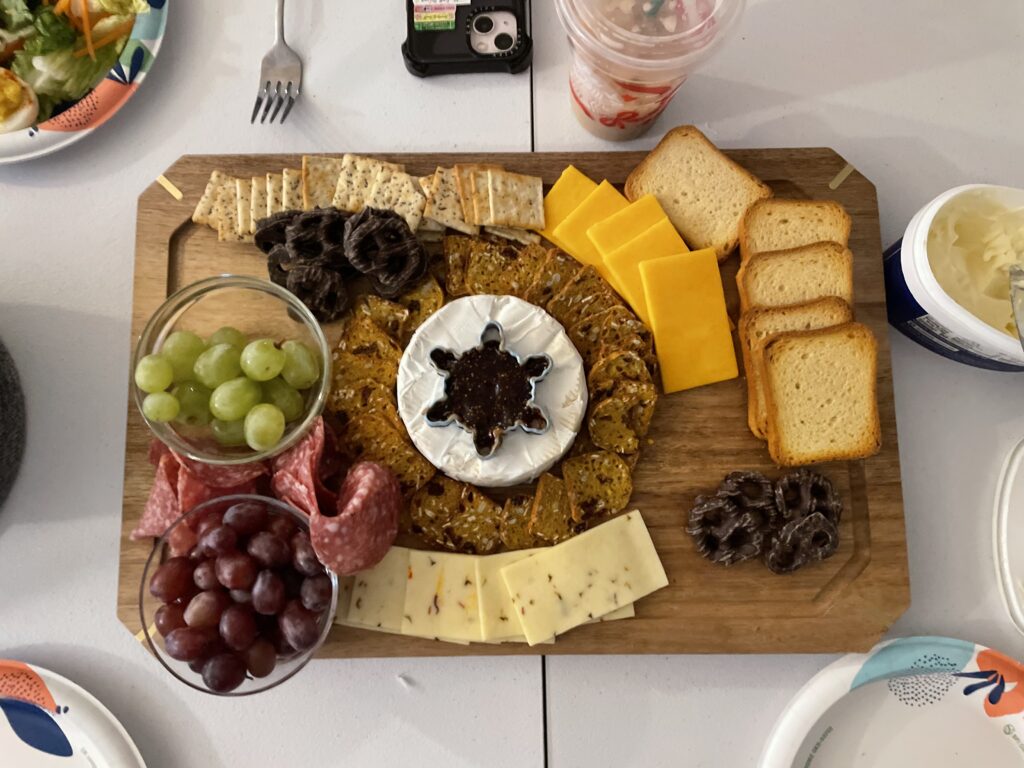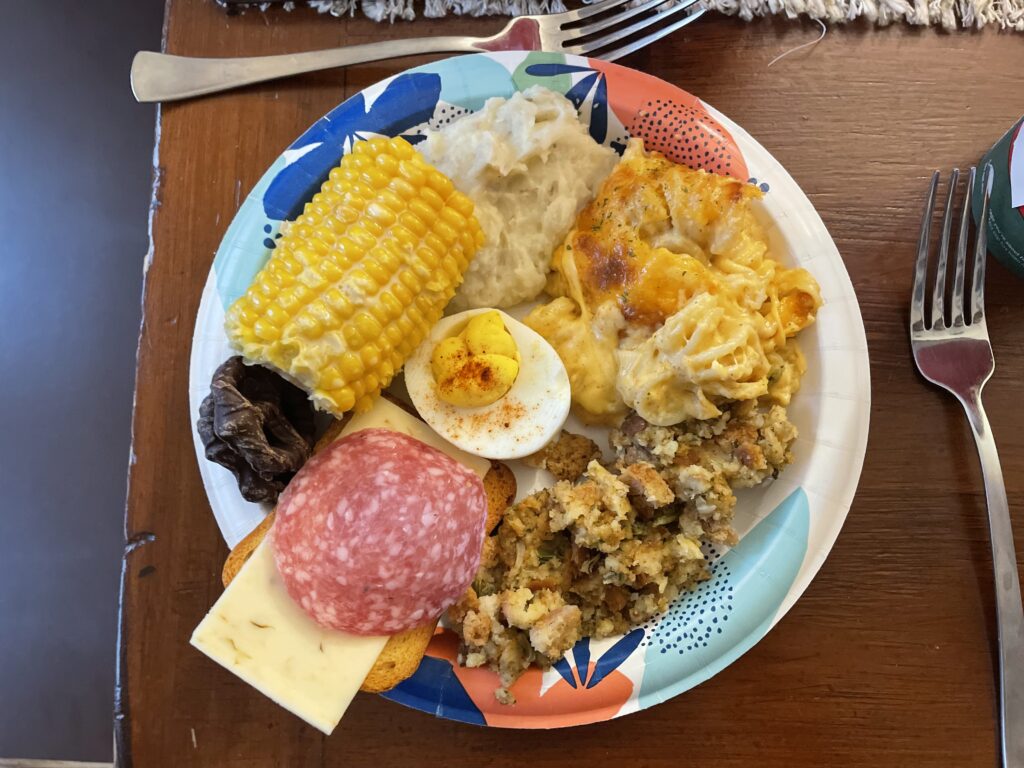SU students take a seat at the Friendsgiving table
College students belly up to the Friendsgiving table
From comfort food to chosen family, students say the casual campus tradition offers a refreshing break from Thanksgiving’s expectations.

Before students pack their bags for Thanksgiving break, many are pulling up extra chairs for a different kind of celebration. Friendsgiving is an increasingly popular tradition blending comfort food and casual vibes as a way to celebrate before heading home.
An Orange Pulse survey this week sought to find out how many students are participating in Friendsgiving, what they think about the made-up holiday and if it feels more meaningful than Thanksgiving.
Sophomore Maddie Eggensperger celebrated Friendsgiving this past weekend for the first time. She said that it means more to her than a traditional Thanksgiving dinner.
“Friendsgiving to me is like Thanksgiving with your found family,” said Eggensperger.
Eggensperger said the dinner she went to felt calmer than a normal Thanksgiving and she was able to make new friends.
“It builds community,” Eggensperger said. “Even though some people don’t know each other, you’re all bound by the same people.

Her favorite part is the good food that people bring, saying that it’s usually less elaborate. For the dinner she attended, it was her first time making deviled eggs.
Eggensperger agreed that Friendsgiving is very different from a traditional Thanksgiving dinner.
“You don’t have the pressure of your family on you,” said Eggensperger. “Thanksgiving is a lot of expectations and formalities, but with your friends, you can just be yourself.”
Sophomore Amanda Simone is also attending a Friendsgiving dinner this year on Nov. 30, a few days after students return from Thanksgiving break. She said she thinks the biggest difference between Friendsgiving and Thanksgiving is the casualness.
“Most of the ones that I’ve been to, we bring leftovers from actual Thanksgiving,” Simone said. “It’s a little more chill.”
Simone said another difference she sees between the two holidays is the age of the people in attendance.
“With Friendsgiving it’s all people of the same generation, like it’s all my friends,” said Simone. “And then Thanksgiving, I have to hang out with the old people, I have to hang out with my little cousins.”
Respondents to the survey overwhelmingly said the biggest difference between the two celebrations was family vs. friends. The next largest response was the casualness of Friendsgiving compared to the formalities of Thanksgiving. Eleven students said they thought Friendsgiving was more fun than Thanksgiving.
When asked if Simone ever feels stressed when preparing for Thanksgiving dinner, Simone said she rarely does. She felt the same about preparing for Friendsgiving because she doesn’t have to cook. Simone has celebrated Friendsgiving just once before with friends from her hometown and said the experience for her was fun.
“The spread of food was better than my actual Thanksgiving,” said Simone. “I don’t have to cook anything because I live in a dorm. I just get to go to the store and then show up and hang out with my friends.”
Simone added she thought students still living in dorms might find it hard to celebrate Friendsgiving because of the space constraint. Even though Simone lives in a dorm now, she is attending a dinner hosted by her friends who live off campus, allowing her to avoid this problem.
“You can’t cook anything in [a dorm],” said Simone. “If all your friends live in dorms, there’s like nowhere to host.”
This problem is not just a hypothetical for many first year students. Freshman Christine O’Grady said she isn’t celebrating Friendsgiving because she doesn’t feel like the dorm creates the right environment.
“Living in a dorm makes you hate a lot of the people around you,” O’Grady said. “Very minimal space and you can’t cook in a dorm, only microwave. I’m not microwaving Thanksgiving dinner.”
When asked about the stress Thanksgiving causes her, O’Grady said it does every year. Coming from a smaller family, she takes on a lot of responsibility during the holiday.
“I’m always the one cooking everything because no one else will do it,” said O’Grady.
A majority of students from all grades who responded to the survey said Thanksgiving never or rarely causes them stress each year. Only 9.1% of respondents said they feel stress every year, like O’Grady. Students who said the holiday causes them stress cited the largest reasons of family drama and feeling like everything has to be perfect. The increase of responsibility during the dinner correlates with an increase in stress.
Out of the two celebrations, she thinks Friendsgiving would bring her more stress than Thanksgiving dinner with her family, and is skeptical of how much fun it would actually be.
“For Thanksgiving, you already know every year who’s going to do what, even if you’re the one doing all of it,” said O’Grady. “With Friendsgiving, it could be new people, new friends, and people don’t like to take a lot of responsibility. You don’t know if the food’s going to be good.”


Freshman Eliana Goff is also not celebrating Friendsgiving this year, but has before. She said it’s too hard to plan around her friend’s availability.
“All of my friends here are going back to their houses and all of my friends in Wisconsin are in Wisconsin, so everyone’s going home,” said Goff. She said it wouldn’t make sense to wait until after the break to celebrate, “Then it’s not Thanksgiving anymore.”
There are less students celebrating Friendsgiving this year than in years past. 57% of student respondents said they were celebrating this year, compared to 60% who said they have held a dinner in years past.
Goff said she wouldn’t mind the stress of cooking for a Friendsgiving dinner, but doesn’t have the resources to execute it how she would want to.
“If nobody else is in the kitchen, then I’d be fine,” Goff said. “But what kitchen would you use, that’s the thing.”
In her opinion, she also thinks that Friendsgiving would be more stressful than the typical Thanksgiving dinner.
“I think Friendsgiving would be more chaotic and Thanksgiving is more planned,” Goff said. “Thanksgiving’s like an actual holiday with adults planning it, and Friendsgiving is just a bunch of college kids.”
Even with the challenges of planning around busy schedules and limited dorm space, many students still find Friendsgiving to be an enjoyable experience. For those who celebrate, the mix of good food, relaxed energy and time spent with chosen family offers a refreshing break from the formality of Thanksgiving. Whether students gather in cramped kitchens or off-campus apartments, Friendsgiving brings people together in their own way.
